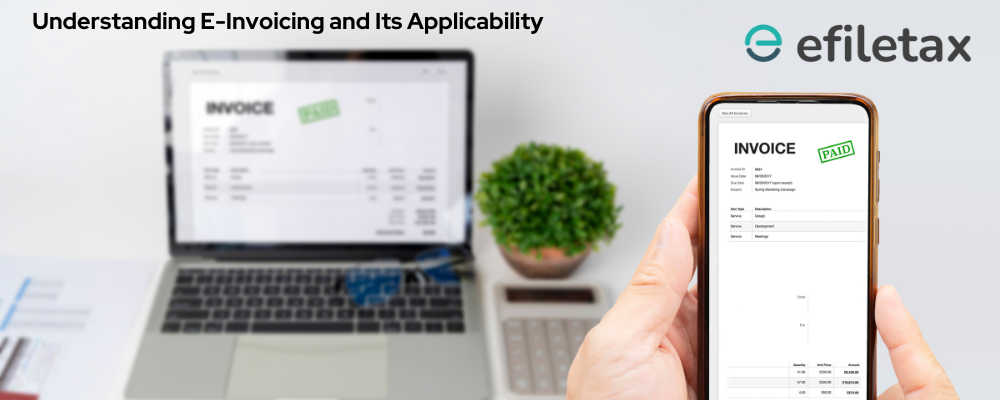E-invoicing is becoming an essential aspect of business transactions in India. This system is mandatory for any registered person whose PAN-based Aggregate Annual Turnover has exceeded ₹5 Crore in any of the preceding financial years, namely FY 17-18, 18-19, 19-20, 20-21, 21-22, 22-23, or 23-24.

What is E-Invoicing?
E-Invoicing, or Electronic Invoicing, is a system where B2B invoices are authenticated electronically by the Goods and Services Tax Network (GSTN) for further use on the common GST portal. This system aims to ensure the accuracy of data submitted and to curb tax evasion.
Applicability of E-Invoicing
E-invoicing will be applicable for the following types of transactions:
- Supplies to registered persons (B2B)
- Supplies to Special Economic Zones (SEZs)
- Exports and Deemed Exports
- Supplies to Government Departments or Government Agencies/Local Authorities/Public Sector Undertakings (PSUs), even those registered solely for TDS deduction under GST.
Transactions Exempted from E-Invoicing
Not all transactions are required to go through the E-Invoicing system. The following are exempted:
- Supplies to unregistered persons (B2C)
- Supplies of nil-rated or wholly exempt goods or services
Categories of Registered Persons Exempt from E-Invoicing
Regardless of the turnover, E-Invoicing shall not be applicable to the following categories of registered persons:
- SEZ Units
- Insurer or Banking Company or Financial Institution, including NBFCs
- Goods Transport Agency (GTA) supplying services related to the transportation of goods by road in a goods carriage
- Suppliers of Passenger Transportation Services
- Suppliers of services by way of admission to the exhibition of cinematographic films in multiplex screens
Importance and Benefits of E-Invoicing
Implementing E-Invoicing brings several benefits to businesses:
- Improved Accuracy: Reduces data entry errors and ensures consistency across the business’s financial documentation.
- Reduced Tax Evasion: Helps the government track invoices and prevent tax evasion through real-time data availability.
- Simplified Compliance: Eases the compliance burden by integrating invoicing with GST returns.
Conclusion
Understanding the nuances of E-Invoicing is crucial for businesses to ensure compliance and leverage the benefits it offers. Whether you are dealing with B2B transactions, exports, or supplies to government agencies, knowing when and how E-Invoicing applies will help streamline your invoicing processes and keep you aligned with GST regulations.
For more detailed information and updates on E-Invoicing, keep an eye on official notifications and consult with your tax advisors. E-invoicing is not just a regulatory requirement but also a step towards digitalizing and simplifying business operations in India.